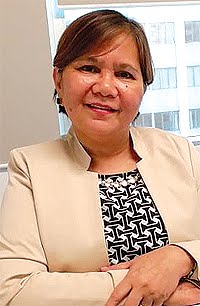There is a “creeping tyranny” in the Philippines, as shown by the big number of people killed in the first two years of the administration’s war on drugs, a figure that now equals the number of those who died in 21 years of Marcos dictatorship, church leaders said.
Two bishops of the United Church of Christ in the Philippines who visited Hong Kong in June said the “Operation Tokhang,” President Rodrigo Duterte’s war on drugs and the extended martial law in Mindanao are manifestations of the drift to authoritarianism.
 |
| Bishop Melzar Labuntog and Bishop Joel E. Tendero. |
Duterte formed the Legislative-Executive Development Advisory Council in 2016 to push for charter change that will allow a shift to a federal system. More recently, he formed a 22-member committee tasked with drafting a new constitution providing for a federal type of government, which is due to be submitted to him on Monday, Jul 16.
“In summary, there is a creeping dictatorship that started with ‘Operation Tokhang’ that began when President Rodrigo Duterte said in his inaugural speech on Jun 30, 2016 that he will end the drug problem in six months,” Tendero said.
The church leaders spoke in a solidarity forum, “Hear the Lament of the Prophets: A solidarity forum on church involvement in the struggle for justice, peace and human rights” that was held in KUC Space in Yaumatei on Jun 29.
They said many church leaders have become victim of human rights violations as government forces harass those who fight for justice, peace and people’s rights, although the number is still below that registered during the Arroyo administration, when UCCP alone lost 28 priests.
In an interview with The SUN a day after the forum, Tendero, citing statistics from various human rights groups and academic studies, said two years of “Oplan Tokhang” has killed about 12,000 mostly poor people suspected of being in the drugs trade.
He said the police estimate was only more than 3,000 killed in legal anti-drug operations.
The German news broadcaster Deutsche Welle gave a much higher figure, citing the Philippine National Police’s Bantay Krimen website which shows 21,999 people died in drug-related killings in 2017, including those slain by vigilantes and drug syndicates.
The creeping tyranny is more intense in Mindanao, where martial law is still in place despite the siege of Marawi ending in October last year. The bishops said Duterte used the attack by Islamist fighters as its justification for declaring martial law.
“Since the declaration of martial law in Mindanao, the number of government troops on the island increased to more than 50% of the 250,000-strong Philippine military,” Tendero said.
The clerics said that unlike the Marcos-era martial law where soldiers were not very visible, large troop concentrations are observed in Mindanao.
Labuntog said martial law in Mindanao is more intense in the rural areas, where soldiers encamp in schools, health centers and multipurpose barangay halls.
He said there was one school near a mining company site where soldiers where asked why they were there in big numbers, and they replied that they were there “to guard the teachers.”
“If the teachers go home on Friday, why don’t you go home as well?” the soldiers were asked and they replied, “Because we will meet with the villagers.”
Tendero and Labuntog said the soldiers, known as peace forces under the military’s “Operation Kalayaan,” were actually engaging the villagers to set up intelligence networks and win their hearts and minds.
The face of martial law implementation was the Marawi City incident, said Labuntog, who was a prelate in Mindanao at the time. He and Tendero said the pocket conflict was used by Duterte to justify martial law on the country’s second largest island.
Harassment of Church people is continuing in the rural areas, as the military brands those who fight for the rights of indigenous people like the lumads as communist sympathizers.
Three priests have been killed since December last year. The most recent victim was Fr Richmond Nilo, who was shot dead on Jun 10 while he was about to say evening mass in Zaragoza, Nueva Ecija.
His death followed the killing of Fr Mark Ventura, an anti-mining advocate who was slain in Cagayan while giving his blessing to children and the choir. In December last year, Fr Marcelito Paez, also of Nueva Ecija, was murdered.
Their deaths followed the killings of many church people from Iglesia Filipina Independiente/Philippine Independent Church, United Methodist Church and UCCP.



















